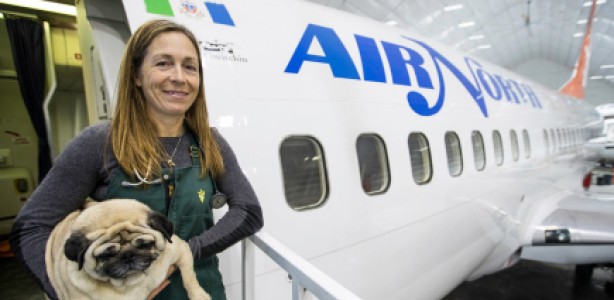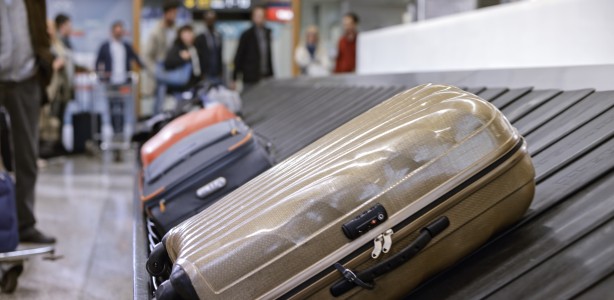Air Passenger Protection Regulations
Air Passenger Protections Regulations (APPR) were developed by the Canadian Transportation Agency (CTA) to establish airline obligations toward passengers, including minimum compensation levels and standards of treatment in different circumstances.
Standard Notice
If you are denied boarding, your flight is cancelled or delayed for at least two hours, or your baggage is lost or damaged, you may be entitled to certain standards of treatment and compensation under the Air Passenger Protection Regulations. For more information about your passenger rights please contact your air carrier or visit the Canadian Transportation Agency’s website.
The regulations set out airlines' obligations to passengers in the following areas:
Communication;
Delayed or cancelled flights;
Denied boarding;
Tarmac delays;
The seating of children under the age of 14;
Lost or damaged baggage; and
The transportation of musical instruments.
In the event of an air travel-related dispute that cannot be resolved directly by a passenger and an airline, the passenger can make a complaint to the CTA.
To ensure our passengers know their rights, we have included the following summaries about the terms and conditions of carriage in certain scenarios. Contact us if you have any questions.
Flight Disruptions
These apply to flights to, from and within Canada, including connecting flights. In particular, it explains that the reasons for flight disruption fall into three categories:
situations within the Carrier’s control;
situations within the Carrier’s control but required for safety; and
situations outside the Carrier’s control.
It is important that passengers and airlines understand these different categories, because they determine what obligations airlines have towards passengers affected by flight disruptions.
Passengers will be contacted via the email provided when the original ticket was booked with any information regarding schedule changes. Passengers are responsible for ensuring that the Carrier has been provided with valid details for communications.
Passengers will receive delay or cancellation information:
• Via the email provided during the reservation process;
• Via the Carrier websites;
• At the airport during check-in;
• At the airport by departure and arrival screens;
• At the airport by Carrier announcements; and
• On the aircraft.
Note: Air North meets the definition of a Small Carrier under the APPR.
Situations Within The Carrier’s Control
If a flight delay, cancellation or denied boarding event occurs and is within the control of the Carrier or within the Control of the Carrier for Safety, and occurs less than 12 hours before the departure time on the additional ticket, the Carrier will provide passengers with the following treatment free of charge:
-
food and drink in reasonable quantities, taking into account the length of the wait, the time of day and the location of the passenger. Where the disruption takes place may affect the type and range of food and drink options. For example, options may be more limited in Canada's North and remote areas; and
-
access to a means of communication.
If the Carrier expects that the passenger will be required to wait overnight for a flight reserved as part of alternate travel arrangements, the Carrier must offer, free of charge, hotel or other comparable accommodation that is reasonable in relation to the location of the passenger, as well as transportation to the hotel or other accommodation and back to the airport or transportation to and from their residence.
The Carrier will also provide a confirmed reservation for the next available flight that is operated by the original Carrier and is travelling on any reasonable air route from the same airport to the destination that is indicated on the passenger’s original ticket. Alternatively, if the passenger is no longer at the point of origin that is indicated on the ticket and the travel no longer serves a purpose because of the delay, cancellation or denial of boarding, the Carrier will refund the ticket and provide the passenger with a confirmed reservation that is for a flight to that point of origin, and accommodates the passenger’s travel needs In any other case, refund the unused portion of the ticket.
To the extent possible, the alternate travel arrangements must provide services that are comparable to those of the original ticket and will refund the cost of any additional services purchased by a passenger in connection with their original ticket if the passenger did not receive those services on the alternate flight; or the passenger paid for those services a second time.
If the alternative travel arrangements provide for a higher class of service than the original ticket, the Carrier must not request any additional payment. If the alternative travel arrangements provide for a lower class of service than the original ticket, the Carrier will refund the difference in the cost of the applicable portion of the ticket.
Refunds under this section must be paid by the method used for the original payment and to the person who purchased the ticket or additional service.
If a denied boarding event occurs that is within the control of the Carrier or within the Control of the Carrier for Safety, the Carrier will provide the same access to communication and standard of care, including possible accommodation if the situation requires it. No passenger will be denied boarding until the Carrier has asked for other passengers to voluntarily give up their seat in exchange for a confirmed benefit, made in writing.
Compensation: Delay, Cancellation or a Denial of Boarding Within Carrier’s Control
If a delay is within Carrier control, and not for reasons of safety, and the passenger is informed 14 days or less before the original departure time of the flight, the following minimum compensation may apply:
a) $125, if the arrival of the passenger’s flight at the destination that is indicated on the original ticket is delayed by three hours or more, but less than six hours,
b) $250, if the arrival of the passenger’s flight at the destination that is indicated on the original ticket is delayed by six hours or more, but less than nine hours, or
c) $500, if the arrival of the passenger’s flight at the destination that is indicated on the original ticket is delayed by nine hours or more
Situations Within the Airline's Control, but Required for Safety
If an airline delays or cancels a flight for reasons within its control, but required for safety, it does not have to compensate passengers. However, the airline must meet the other obligations described in Within Carriers Control.
Situations Outside the Airline's Control
If an airline delays or cancels a flight for reasons outside its control, it does not have to compensate affected passengers, and the requirement to provide minimum assistance (food, drink, access to communications, and overnight accommodations) does not apply. However, the airline must follow the communication requirements described in Within Carriers Control. It must also make alternate travel arrangements for passengers, or, in certain circumstances, provide a refund.
Compensation: Lost, Damaged or Delayed Baggage
If a Carrier admits to the loss of baggage (the delayed return of baggage to the passenger), or if baggage is lost for more than 21 days or is damaged, the Carrier must provide compensation equal to or greater than the sum of:
• the fees paid for that baggage,
• the value of the baggage and its contents; and/or
• the interim expenses of the passenger
Interim expenses are considered items required by the passenger for the purpose of the travel taken. When replacing items, passengers are also reminded they are required to limit their loss, as most baggage is returned to the passenger.
The maximum liability of the Carrier is 1288 SDR. The Carrier does not provide an option to insure for higher values; passengers wishing to do so should contact an independent insurance agent.
Visit this page for more information and compensation on baggage.
Tarmac Delays
When a tarmac delay occurs, we must provide affected passengers access to working lavatories (if the aircraft is equipped with lavatories), proper ventilation and cooling or heating of the aircraft, if it is feasible to communicate with people outside of the aircraft, the means to do so, food and drink, in reasonable quantities, taking into account the length of the delay, the time of day and the location of the airport reasonable quantities of food and drink (non-alcoholic).
If a passenger requires medical assistance, the carrier will assist in obtaining medical assistance.
Once an aircraft is delayed on the tarmac at an airport in Canada for more than three hours, after the aircraft doors have been closed for take-off and after the flight has landed, or at any earlier time if it is feasible, the airline must let passengers disembark. Passengers with disabilities will be consulted to determine whether they would like to disembark first, along with their support persons and/or service animals.
Exceptions
Airlines are not required to let passengers disembark at the three-hour mark if takeoff is imminent and they can meet all required standards of treatment previously listed until take-off.
“Takeoff is imminent” means it is the reasonable opinion of the pilot in command that takeoff will occur no later than 3 hours and 45 minutes after the start of the tarmac delay (i.e., when aircraft doors were closed).
Airlines are also not required to provide passengers the opportunity to disembark if they are prevented by reasons beyond their control such as reasons related to safety and security or to air traffic or customs control.
Children Under the Age Of 14
For the seating of children under age 14, we will attempt to assign a seat before check-in to the child that is close to their parent, guardian or tutor. If no seats are available, we will assign seats at the time of check-in, or ask for volunteers to change seats at the time of boarding, or ask for volunteers to change seats prior to take-off, all at no additional charge.
For children four (4) and younger, we will attempt to assign a seat adjacent to their parent, guardian or tutor. For children between 5 and 11, we will attempt to assign a seat in the same row as their parent, guardian or tutor, with no more than one seat separation. For children aged 12 or 13, we will attempt to assign a seat in a row that is separated by no more than one row from their parent, guardian or tutor. The Carrier will not force another passenger to change seats or leave the flight to seat a child and accompanying passenger together.
Diversions
Should a flight be diverted to an alternate airport, Air North will proceed to the original intended destination once the situation has been resolved and the flight has been authorized to proceed. Diversion airports are selected in order of safety & suitability, as well as trying to provide a minimum of disruption & inconvenience and the maximum support to passengers. In some cases, alternates outside of Canada are selected. In these instances, the laws of these countries may supersede those in Canada. Air North accepts no liability for passengers who may be detained with the exception of a refund of the unused portion of the ticket.
Our Tariffs
For full terms and conditions of carriage applicable to our air services please visit our Tariff.
*Tariffs are subject to change without notice.




